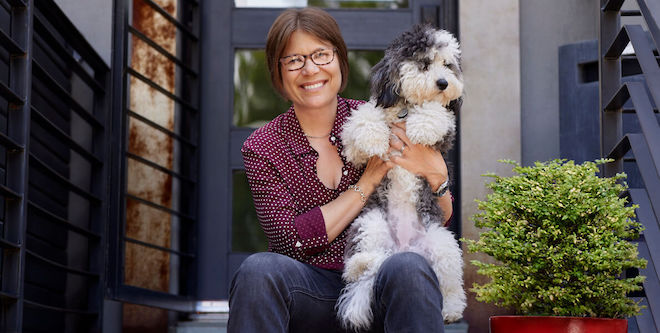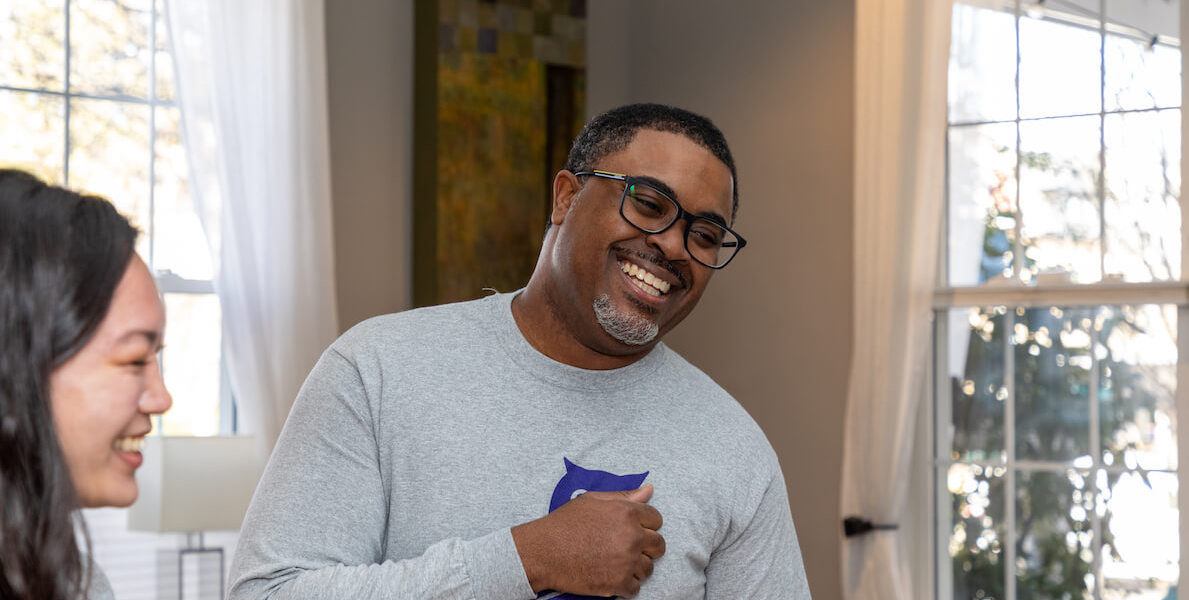In 2020, at the height of the uprisings over George Floyd’s murder, real estate entrepreneur Lisa Wise found herself thinking about housing: How it was often unaffordable, especially for people from under-resourced communities. How this country’s historically racist policies had purposely excluded Black and Brown people from home ownership. What her role was — or could be — in undoing some of these many wrongs.
As the owner of Flock, a Washington D.C.-based family of real estate companies, Wise was running a company that oversaw more than 1,200 buildings and brought in $6.5 million in revenue in 2021. At the same time, she had always been critical of the role real estate plays in building wealth for many Americans — something that came from her own experience: When Wise bought her first home at the age of 25, after living in 23 different houses, it was the first time in her life that she was housing secure.
The average U.S. homeowner’s net worth is $195,400, compared to $5,400 for the average renter, The New York Times reported in 2017. Meanwhile, only 43.4 percent of Black families own their homes compared to 72.1 percent of White families, per CNN. That number is lower than it was a decade ago.
“I decided that I felt very uncomfortable profiting or being profitable in an industry that really disregarded so many in our country,” she says. “Our real estate industry has done a disservice to people who are minorities. The real estate industry has intentionally created a wealth gap. The real estate industry has intentionally excluded people of color from opportunities.”
So, in 2020, Wise used some of her company’s profits to create birdSEED, a nonprofit that gives grants to Black and Brown first-time homebuyers. So far, birdSEED has provisionally awarded $180,000 to D.C.-area residents. This year, the organization will launch in Philly, with the first round of grants to be distributed in October.
From housing insecure to landlord
Wise first became a landlord back at age 25, when she purchased the adobe duplex that she had previously been renting in Tucson, Arizona. She got the down payment for the home by selling a used car she inherited from a cousin.

Lisa met her cousin Richard Wise when she left Idaho to attend the University of Arizona. The pair, she says, “immediately bonded.” Richard was an architect who designed natural habitats for zoos, work that Wise found fascinating. He also had AIDS and, when he got sick, Lisa cared for him. When he died in 1997 from syndrome-related complications, Richard left Lisa everything, including his 1995 Honda Civic. The $8,300 she made on the sale of the car became the downpayment on the duplex.
“I’m grateful every day for that windfall,” she says. “It was kind of a miracle I made it to college. And that housing insecurity, for me, was really formative in terms of how I considered my own sense of security.”
After college, Lisa spent 15 years as an in-house policy consultant for Planned Parenthood and executive director for the environmental-focused organization Center for a New American Dream. Along the way, she maintained her side hustle as a landlord.
In 2008, after the recession hit, Wise realized she loved these nonprofits’ missions, but felt disconnected from the direct service opportunities that attracted her to them in the first place. As a landlord, however, she could feel the direct impact she was making on people’s lives by providing them with quality, affordable places to live. She decided she wanted to turn that into her full-time business.
“The first thing that we really wanted to do was be a purpose-driven company. We want to make a difference in our community,” she says.
So far, birdSEED has provisionally awarded $180,000 to Washington residents. This year, the organization will launch in Philly. Wise plans to give out the first round of grants in October 2022.
Finding success as a landlord was fulfilling, but, as Wise looked around at her employees, she knew she wanted to do more to help them build wealth. She didn’t want to just create jobs; she wanted to help people build careers. Even in the business’s early days, she paid staff a living wage with full benefits, and intentionally recruited workers without four-year degrees. Today, she has 70 employees in Washington and one in Philly, with plans to hire another this year. The first person she hired is still with the company to this day.
Her next step in the wealth-building process: Helping her employees become business owners themselves. When Nest DC, her first company, reached 200 properties — the level she says a real estate company needs to be sustainable — she decided to create businesses with opportunities for employee ownership, so that everyone could share in the business’s success.
“It seemed really unfair that I’m the owner when all these people that have worked so hard with me to get here are not also owners. That was kind of a really big catalyst moment for me,” Wise says.
In 2013, she started Roost DC, an employee-owned condo and HOA management company. (Other Flock employees can also buy Roost ownership shares.) In 2016, she launched Starling DC, an in-house maintenance company to serve the properties she owned and the condos the company managed.
Three years later, Wise started BirdWatch to provide repair services, preventative maintenance and renovation advising to homeowners, for a monthly fee. Wise describes BirdWatch as like having a landlord for your home.
BirdWatch charges $50 per month for condos and $75 per month for single-family homes. Services cost $125 per hour for regular maintenance visits and $150 per hour for renovation advising. The company partners with local home repair vendors so that neighbors are helping each other prevent problems in their homes.
Wise plans to sell all of her companies to her employees when she dies, Inc. reported.
Wise’s companies’ bird names are inspired by her grandmother, whose Colorado farm Wise visited as a girl. She remembers the farm’s views of the Rocky Mountains — and her grandmother, a painter, throwing watercolors off a balcony. The shapes that emerged reminded Wise of bird wings. The home was one place Wise felt she truly had a “nest.”
Throughout it all, Wise has kept her nonprofit roots close to her business. Alongside her former business partner, she helped Planned Parenthood design a landscaping plan with thorny plants to discourage anti-abortion protesters from hanging out outside clinics.
“I always say you can take the girl out of a nonprofit, but you can’t take the nonprofit out of the girl,” Wise says. “[We were] doing as much service work as we could find because we had time, we didn’t have cash.”
Bringing home ownership within reach
In 2020, Wise was in a position to do more. She founded birdSEED, the organization’s philanthropic arm, by taking $215,000 from Flock’s profits to fund the first few rounds of grants. Soon, birdSEED started receiving donations from like-minded organizations. Flock covers all administrative costs and services, so any donations the nonprofit receives go directly to supporting first-time homebuyers.
“Philadelphia, along with other large cities are losing their natives due the increasing costs of homes,” Christian adds. “There are many young people who are living and thriving in Philadelphia, but are afraid to take that leap in purchasing a home. BirdSEED would absolutely relieve some of that anxiety — and I’m a great example of how it did.”
BirdSEED’s grant application is a single page, most of whose two dozen questions require only yes or no answers. Wise wanted the form to be quick to fill out to make it accessible to as many people as possible. The company started by giving out $5,000 grants, but quickly realized buyers needed more funds to purchase a home. Now, birdSEED gives from $8,000 to $10,000 per buys, enough to help buyers start saving toward a downpayment. The average grant is $8,600.
“It’s really hard for people to come up with that down payment amount,” Wise says. “There’s always an emergency that comes up.”
BirdWatch and birdSEED are launching in Philly this year, and are in the process of seeking donations, recruiting grant applicants and building out a Philly-based advisory board to help review applications and recruit partner organizations and applicants.
Though there are other programs in Philly and Pennsylvania aimed at helping first-time buyers purchase a home, birdSEED is unique in offering grants rather than interest-free or forgivable-over-time loans. Wise wanted to create something less burdensome for applicants.
“I understand why people want to create accountability metrics and milestones, but at the same time, we also feel like people know what to do with money. If people need to buy a home, that’s one of the greatest wealth-building decisions you can ever make,” she says.
Tony Keith is one buyer who has benefited from birdSEED’s grants. Keith purchased a three-bedroom townhome in Washington with his husband, Philly native Harry Christian III, in September 2021.
Keith learned about birdSEED when a friend texted him the link to the organization’s website. Part of the reason the couple wanted to buy a home was so Keith’s grandmother, who is in her early 80s, could visit. Before buying, they lived in a third-floor walkup apartment. Their $10,000 BirdSEED grant helped them find an accessible home. Their search was featured on an episode of HGTV’s House Hunters.
“We were trying to figure out the easiest way or the most efficient way for us to buy a home. It’s been difficult. It’s just really really expensive. Black folks, we always experience all sorts of issues with home buying and lending,” Keith says. “[birdSEED’s] accessible. It’s easy. The people, certainly the ones that are working there now … they have your best interests at heart. It’s an organization that wants to do the real work.”
Christian holds himself up as an example of how birdSEED can help not only homebuyers, but also the city writ large.
“Philadelphia, along with other large cities are losing their natives due to the increasing costs of homes,” Christian adds. “There are many young people who are living and thriving in Philadelphia, but are afraid to take that leap in purchasing a home. BirdSEED would absolutely relieve some of that anxiety — and I’m a great example of how it did.”
If the Philly launch proves successful, Wise hopes to bring BirdWatch and birdSEED to other cities. The two will travel as a pair, she says, because both firms are geared toward making home ownership more accessible and helping people build wealth through homes and solid employment. BirdWatch takes care of maintenance issues for homeowners and birdSEED helps them take the leap by purchasing a property.
“birdSEED will go wherever Bird Watch goes. They’re a matched set,” Wise says. “We’ve agreed to and committed to making sure that we help advance home ownership as part of our corporate objectives.”
Correction: A previous version of this story misstated the status of grants BirdSEED has awarded. So far, it has given away $180,000 in provisional grants.
![]()
RELATED STORIES FROM THE CITIZEN ON HOUSING



